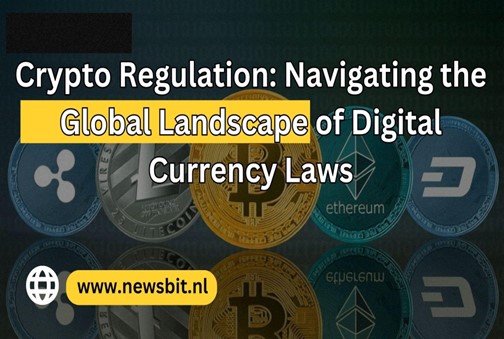Since the launch of Bitcoin in 2009, the cryptocurrency industry has swiftly developed. It has evolved from a specialized idea into a worldwide phenomenon that has the potential to disrupt finance and other sectors. Regulators and policymakers have noticed this revolutionary potential, though.

Introduction
The necessity for thorough and balanced crypto regulation grows along with the ecosystem of digital currencies. In this essay, we examine the various tactics used by various nations, the main issues motivating regulatory initiatives, including the impact on the Bitcoin kurs, and the upcoming difficulties in the complicated and dynamic world of cryptocurrency regulation.
Early Days: The Wild West of Cryptocurrency
The absence of clear regulations during the early stages of cryptocurrencies was notable. The earliest and best-known cryptocurrency, Bitcoin, emerged as a disruptive force, upending long-standing standards in the financial industry. For authorities, this novel technology—based on the blockchain, a decentralized ledger—brought both potential and difficulties.
Governments had a hard time articulating their position on this innovative digital commodity because there was no clear precedence. Due to the absence of regulations, a “Wild West” mindset developed, with dishonest individuals taking advantage of the oversight gap.
Global Regulatory Approaches
Cryptocurrency regulations vary significantly across nations, reflecting diverse economic, cultural, and political contexts. Some countries, like Japan and Switzerland, embrace digital currencies, fostering innovation through clear legal frameworks. In contrast, others, including China and India, exercise caution with bans or restrictions.
These differing approaches shape the crypto landscape, influencing investor confidence and market development. The challenge lies in finding a harmonious balance between encouraging innovation and safeguarding against potential risks as nations strive to navigate the intricate web of global cryptocurrency regulations.
Securities and ICO Regulation
In the world of cryptocurrencies, the classification of tokens as securities has been a contentious topic. By requiring openness and responsibility from issuers, securities regulations aim to protect investors. However, the application of these regulations to cryptocurrencies can be challenging, as tokens can serve various functions within decentralized networks.
Initial Coin Offerings (ICOs), fundraising mechanisms where new tokens are sold to investors, further complicate the regulatory landscape. Some ICOs have raised substantial amounts of money, leading regulators to scrutinize these offerings and determine whether they fall under existing securities laws.
Taxation and Reporting
The taxation of cryptocurrency transactions and investments is another aspect that regulators are keen to address. The decentralized nature of cryptocurrencies poses challenges to traditional tax frameworks. Determining the tax implications of various crypto-related activities, such as trading, mining, and staking, requires clear guidelines from regulatory bodies.
Moreover, reporting requirements for cryptocurrency users and businesses play a crucial role in ensuring that tax obligations are met. The lack of proper reporting mechanisms can lead to tax evasion and hinder the ability of governments to collect revenue.
Crypto Exchanges and Licensing
Crypto exchanges play a pivotal role in the digital currency ecosystem, facilitating the buying, selling, and trading of cryptocurrencies. To ensure user safety and market integrity, many countries have introduced licensing requirements for these platforms. Licensing mandates adherence to security, transparency, and customer protection standards.
By monitoring and supervising exchange activities, regulators aim to prevent fraud, hacking, and market manipulation. Licensing crypto exchanges not only fosters a secure trading environment but also bolsters the legitimacy of the crypto market, instilling investor confidence and encouraging wider adoption of digital assets.”
Blockchain Technology Regulation
While much of the focus on crypto regulation centers on digital assets, the underlying blockchain technology also raises regulatory considerations. Blockchain has applications beyond cryptocurrencies, including supply chain management, identity verification, and more.
Regulators must strike a delicate balance between fostering innovation and ensuring blockchain-based solutions adhere to existing legal frameworks. This balance requires a nuanced understanding of the technology and its potential impact on various industries.
Central Bank Digital Currencies (CBDCs) and Regulatory Challenges
The emergence of CBDCs as digital representations of national currencies presents a unique regulatory landscape. Balancing innovation with financial stability, regulators must address data privacy, cybersecurity, and cross-border implications. The design and operation of CBDCs necessitate meticulous legal and technical considerations, reflecting the convergence of monetary policy and digital technology.
As governments navigate these uncharted waters, collaborative efforts are essential to harmonize global standards. Successfully managing CBDC regulatory challenges will shape the future of digital finance, reshaping monetary systems while safeguarding economic integrity and individual privacy.”
Global Coordination Efforts
Cryptocurrency’s borderless nature necessitates international collaboration in crafting effective regulatory frameworks. The Financial Action Task Force (FATF) and similar bodies strive to establish unified standards against money laundering and illicit activities. However, harmonizing diverse national regulations proves intricate, given cultural and economic disparities.
A cohesive global approach is crucial to ensure fair market practices and protect users. Coordinated efforts can mitigate regulatory arbitrage and create a level playing field, bolstering investor confidence and fostering responsible innovation while addressing the challenges posed by the decentralized digital economy.”
Industry Self-Regulation and Standards
In addition to government-led regulation, industry self-regulation and the establishment of standards play a significant role in shaping the crypto landscape. Industry associations and organizations set guidelines and best practices for businesses operating in the cryptocurrency space. These initiatives help promote transparency, security, and ethical behavior within the industry. By taking proactive measures to address regulatory concerns, the crypto community demonstrates its commitment to responsible innovation.
Evolving Landscape: Future Trends and Challenges
The dynamic crypto landscape is poised for remarkable transformation. As blockchain technology matures, regulators face the task of adapting regulations to evolving complexities. Striking equilibrium between innovation and stability remains paramount. Regulatory sandboxes may facilitate controlled experimentation. Cross-border transactions, DeFi innovations, and tokenization trends will shape regulation.
Challenges include maintaining consumer trust, staying ahead of technological advancements, and countering potential misuse. Collaboration between regulators, industries, and innovators is vital. Navigating this shifting terrain requires forward-looking, adaptive approaches that harness crypto’s potential while safeguarding financial integrity and societal well-being.”
Conclusion
In the dynamic realm of cryptocurrency, effective regulation is paramount. Striking a delicate balance between fostering innovation, ensuring user protection, and maintaining market integrity is a formidable challenge. As the global adoption of digital currencies accelerates, regulatory frameworks must evolve in tandem.
Collaborative efforts among governments, industry stakeholders, and technological innovators are essential to navigate the ever-changing crypto landscape.
By fostering responsible growth, transparent practices, and global coordination, we can unlock the transformative potential of cryptocurrencies while safeguarding financial systems and the interests of users worldwide.”

 Hot Features
Hot Features









